Why Hire an Advocate?
It is my firm and foundational belief that advocates should not contribute to or initiate an adversarial approach between schools and parents. This removes the focus from your child. At Bright Partnerships, our goal is to face teams forward, in partnership, that allows teams to effectively create an IEP that is reasonably calculated to ensure meaningful progress in light of the students individual circumstances, and accessing FAPE in the least restrictive setting.
An Advocate…
- Speaks to the best interests of the student in the educational process.
- Knows State and Federal laws pertaining to children with special needs/abilities and can inform parent(s)/guardian(s) of their rights.
- Helps parents partner with school teams to identify accommodation, adaptations or potential modifications needed to meet the student’s unique needs.
- Helps interpret and explain assessment reports (to students/parents/guardians/institutions), and the data’s significance to the student’s educational needs.
- Review results of IEE and provide guidance or recommendations
- Collaborates on Positive Behavior Support (PBS) planning
- Helps parents/guardians put requests in writing
- Prepares parents for the IEP/504 meeting. This could include interpreting and prioritizing support materials, proposing goals and objectives, formulate questions they may have.
- Reviews education documents, including files, assessments, evaluation reports, drafted IEPs/504s, report cards, observation reports, ect. prior to IEP/504 meetings
- Accompanies parents/guardians to IEP, 504, and other relevant school meetings to provide advice and assistance
- Reviews IEP documents before parent/guardians sign them
- Drafts letters, responses, complaints and written requests to school and district officials
- Empowers and educates families (parents and students) to strengthen their own advocacy skills
- If you are ready to take your case to due process, an advocate can help advise you on the strength of your case and make referrals to local special education attorneys
Who Does a Special Education Advocate help?
A Special Education Advocate assists families of children with any learning concerns. Some students have needs that are already identified, whereas other parents will seek advocacy support in helping them identify issues that may be affecting their child’s learning. Common examples of Learning Concerns:
- Dyslexia
- ADHD, Sensory Processing Disorders
- Learning disabilities and processing disorders (math, reading, writing)
- Speech and Language deficits
- Hearing and/or Visual Impairments
- Autism Spectrum Disorder
- Behavioral and/or Emotional disorders
- Physical disabilities
- Chronic illnesses
- Traumatic brain injuries
- Intellectual Disabilities
